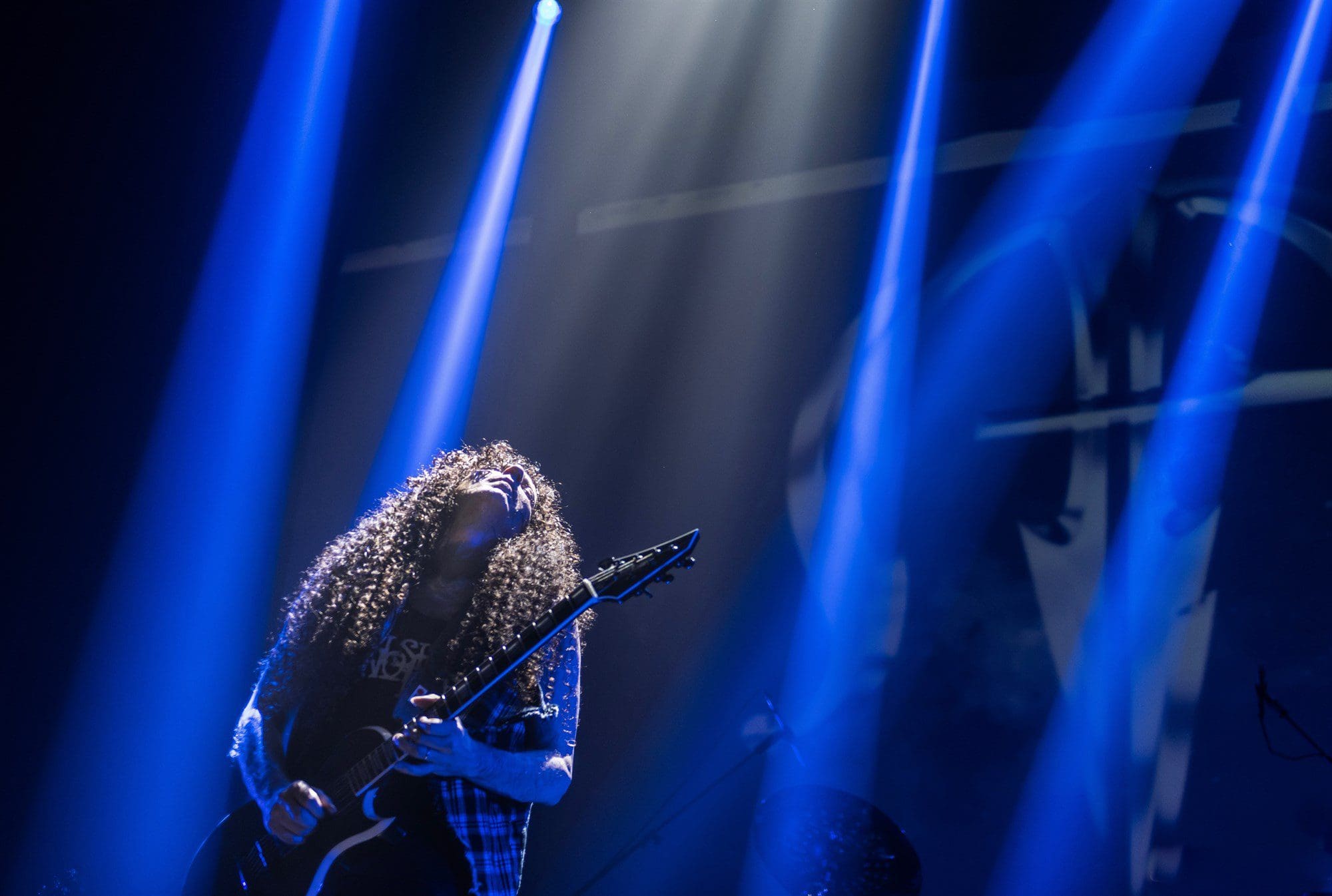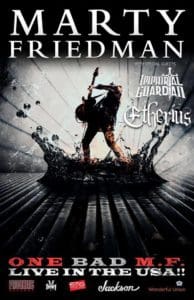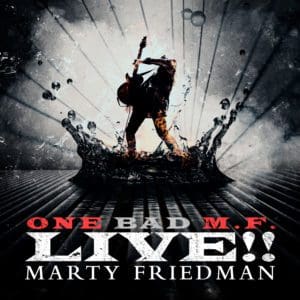
Throughout the course of music history, the songwriters who undoubtedly have the strongest impact are those who exhibit zero fear and tap into this perspicacious mindset that completely blocks out the outside world, therefore allowing them to unleash what could only be described as true musical freedom, and virtuoso guitarist Marty Friedman is the perfect embodiment of this incredibly rare level of exceptional artistry.
In 2019, Marty Friedman is truly standing stronger than ever as he recently released a double-live LP, One Bad M.F. Live!!. For the past the past 16 years, Friedman has become a massively influential musician in Japan’s domestic music scene, think along the lines of Nile Rodgers in terms of his legacy as a producer, songwriter, and performer. And since 2014, Friedman has completely re-acclimated himself with fans across the world and is currently touring behind his latest album, which includes an upcoming stop at the Crossroads in Garwood, New Jersey on February 23.
For anyone who enjoyed his career-defining masterpiece, 2017’s Wall of Sound, One Bad M.F. Live!! invokes the prime emotional innocence, gorgeous melodies, jaw-dropping musicianship, and uplifting sense of hope that is paramount to Marty Friedman’s core sound. Plus, his heart-throttling riffage on performances like “Self Pollution” and “Whiteworm” stand shoulder-to-shoulder alongside some of the most cutting-edge artists in modern metal. Imagine if groundbreaking athletes like Michael Jordan and Kobe Bryant could perform at their peak levels and continuously master their craft for over 30 years, and better yet, this isn’t a fictional scenario for Marty Friedman, it’s reality.
In fact, I recently interviewed Marty Friedman and we truly delved into all aspects behind the live experience for One Bad M.F. Live!!, the songwriting process behind the critically acclaimed Wall of Sound, and his one-of-a-kind ability to continuously push the status-quo of the guitar into unprecedented heights.
One Bad M.F. Live!!, could you talk about the importance of capturing this momentum you’ve had since Wall of Sound? Also, could you elaborate on the band effort and what these last two-years have been like?
Yeah, it’s just been a whirlwind and I mean, my band is better than ever. I’ve been touring behind my solo music, I would say since 2002, and we’ve probably made our strongest progress over the past four-years since Inferno, because that’s when I decided to do a lot more touring outside of Japan and get a really solid stable band lineup. I mean, I’ve had some super, super band lineups in the past but it was usually just for one tour or one event or something like that. I’ve had this same band since Inferno and it just keeps getting better and better. I wanted to have a document of that and that’s what the live album captures.
Over the past four-years, performing alongside Kiyoshi, Jordan Ziff, and Chargeeee, you could really hear this chemistry you’ve developed on songs like “Street Demon” and “Ripped Medley.” Could you talk about their performances and how this album isn’t just a solo showcase?
Thank you so much, man! That’s exactly what I like to hear. I always prefer to be entertained by a band, like a four-cornered diamond so to speak. I would get really bored of anybody if there was just one guy with a band backing them up. It’s so important that my band blows me away every night and entertains me so that’s one thing I’m really happy about with my band.
One thing I found pretty cool about One Bad M.F. Live!!, the track listing has songs from Loudspeaker and Tokyo Jukebox where fans like myself, you had to go searching for those back then.
(Laughs) I appreciate that a lot. Yeah, it’s basically a representative showcase of our setlist and I made a double-album so that gives us about 80 minutes of music. Our actual set is a little bit over two-hours so I had to cut out some certain things, but I wanted to keep the pace of our show pretty much exactly like it is when you see us live. I included a lot of different parts of my career, which people seemed to really enjoy during our shows.
Looking back at the show and a moment like “Amagi Goe,” where you have those extended bends and that real sense of fluidity in your playing, how does it feel to have that live freedom and aggression captured on a record?
Well, that’s basically what I’m feeling every night out here on the tour and every night is a little bit different. I try to have as many happy accidents as possible and we leave tons of space for all four of us to take liberties. It’s definitely not a recital where it’s like, “Here’s the music we’re going to play for you.” It’s nothing like that. It’s like, “This is what we plan to do but we’re going to change it up on you and we’re going to throw you some curveballs along the way.” Depending on your reaction, we might extend this or shorten that. It’s very interactive and if that comes across on a live album, that’s great because live, you could really tell it’s happening. Sometimes, it’s hard to bring that into the actual recording and get that vibe across.
When you perform a song like “Whiteworm” live, I would say it gives your song a second life and a different dimension that what you have on the studio recording.
Ah, you’re my favorite, man (Laughs)! That’s exactly what I want to hear. Sometimes when you do a live recording, you feel like, ‘Well, this is already out and we’re playing it just about exactly the same, so why do it again?” I always hope that people see it as a completely new, different sounding version. I remember when I was kid when I would hear live versions of songs, I was like, “There’s a studio version and a live version and they were totally different entities.” If you’re getting that, my job is complete because that’s what I’m really shooting for myself.
Do you think live albums could make a comeback in the age of digital streaming? Considering how touring has become the main source of revenue for bands, should there be a greater emphasis to capture those experiences, much like it was back in the day? In my opinion, a live record is a record.
I totally agree, I mean, it’s a little bit different now because you could go on YouTube and see what actually goes on during concerts. And not only from a professional video standpoint, you could see the fans eye view from their cellphones so there’s really no mystery about what happens in those venues. When I was a kid, we didn’t have any of that so we would listen to the live albums and our imaginations would just go crazy.
It was like, “What’s going on in there?!?” I would hear fireworks going off and I’m hearing people screaming. There were these big rushes of applause’s at certain points. It was like, “What are they doing? What is going on?” The mystery that was there back in the day is no longer there now, but I hope when people listen to this live album, they feel a little bit of that old school pacing and that kind of wonder, “What’s going on in the venue?” And something that makes you want to go to the venue yourself.
It’s the ultimate calling card.
Yeah, literally, this is what you get it. Now it might be an hour-and-a-half longer but this is basically what you get.
For Wall of Sound, from a production, audio engineering, and compositional standpoint; to balance the diversity in your tones and all of the different time changes, how do you wrap your mind around such an eclectic, widespread gallery of ideas?
That’s a great question. The easy answer, it just takes time and it also takes tons of demos. On Wall of Sound and even Inferno as well, I spent about sixteen-to-eighteen-months polishing these demos so the demos were exactly what I wanted the albums to be. And then all I did was go into the studio and recreate those demos. While I was recreating the demos, I was finding things that I could make more interesting, which even exceeded my expectations. All the work is living with demos for months and months and months; and editing, tying things in different keys, and experimenting with different kinds of sounds. The demo stage is my big working point. Once I get into the studio to record, it’s just a performance and it’s a lot of fun.
Going off my last question, for a song like “Sorrow of Madness,” which was recorded with Jinxx (Black Veil Brides), how do you balance the classical component of the violin with your heavier approach? And even beyond that, where you have this super heavy riff after this beautiful melody and this lead harmony; could you describe your mindset when approaching a song like that?
Okay, this is really important to me because the easiest thing in the world would be to connect a bunch of cool riffs together, and that’s something all of us are guilty of sometimes. What’s important to me is that things lead into each other in such a way that you feel, as a listener, certain emotions and certain waves of feeling good whether that bring a tear to your eye, chills down your spine, goosebumps, or something like that. That takes a lot of work, that takes trying the connection of so many different things and different parts; listening to it, and evaluating the demos.
And it takes realizing that you might have to throw something away that you have worked on for months. It could be hard because you worked on it and you thought you nailed it but nope, no emotional reaction, so you have to throw it away. Connecting things is so incredibly important and building up to the climaxes, I think I did a really good job of that on Wall of Sound.
The last song, “The Last Lament,” is the only one where I think I might be a hair guilty of connecting unrelated stuff with the hopes that it will garner some type of emotional reaction when it’s done. I just had to okay it and believe in it. I still think that song has too much tangent going on, but I still love it and all of the parts. With the other songs, it’s pretty flawless as far as my personal opinion is concerned. The only that really matters is everyone else’s feelings and not mine. I know I’m into it but if other people could enjoy it than my work is done.
One notable aspect about Wall of Sound is the sonic balance, you might get a heavy track with complex time changes, but you also have an emotive song like “For a Friend” driven by passion and intricate note selection. Conceptually, do you approach an album like a film score or even like a suite in an orchestral sense?
Kind of, yes. I’m definitely looking for contrast and I’m also looking for tension and relief. If you have a bunch of really loud stuff and then it suddenly breaks down on a dime, I mean, it just immediately changes, you’re going to feel some kind of emotion there. That’s a chance for you to make some points, if you do it well. A band that does this very well is Opeth. When they go from heavy to quiet, they really take you with them. I think they do such a great job of balancing that dynamic. I try to use contrast to my benefit as best as I can.
To harken back to Speed Metal Symphony and even Dragon’s Kiss and think forward to now, how does a musician of your caliber truly push yourself and not rest on laurels? How do you truly challenge yourself to really push your craft into unprecedented territories and levels?
Wow, hearing that is really nice to hear and making me dread the next interview when the guy just asks me, “So what’s it like after leaving Megadeth (Laughs)?” I mean, I’m really dreading this next one (Laughs). That’s a great question but I think the only answer is, what else am I going to do? I’m so used to pushing myself and trying not to repeat myself and trying things that excite me musically. It’s just what I do naturally and I think it would be more unnatural for me to not do that. I kind of wish I wasn’t like that because it’s insane hard work and it’s always a pain in the ass, but it’s always what I want to do. I look back at old stuff and it’s still okay. I just prefer the stuff that is more refined and more well-thought-out.
As far as fans go, music is not about the content of music, it’s about their own particular experiences with the music. There’s just no way someone is going to pick up Wall of Sound and compare it to the decades of experience they’ve had with Dragon’s Kiss. They might remember when they were a kid and they picked up the guitar and tried to play “Dragon’s Mistress.” They might have had that song playing in the background when they were with their girlfriend’s back then, even though I probably would’ve chosen something a bit more romantic than my own album (Laughs). You know, it’s all about people’s experiences and not so much the content. For me, as the person writing the album, it’s all about the content. For whatever reason, I’m just happy to have the ability to push myself into more interesting motifs in music.
And what I appreciate about your approach for Wall of Sound, you have the personal perspective of what you wanted to accomplish musically but for fans worldwide, you also incorporate elements of what we’ve enjoyed on albums like Scenes and Loudspeaker. And it’s all combined with modern production value that makes it insanely heavy and dynamic.
Well, thank you. I’m always trying not only to please myself but if you’re going to release it, you also want please the people who are the end users so to speak. I have to please both equally. If I just tried to make a record that fans would want, or what’s trendy, or what the record label thinks fans want, I would probably suck at it. If I were to make a record that would only please me, it would probably be so eclectic that nobody would get it. I’ve got to find something that fits both criteria and that’s what I’ve done ever since Inferno. It’s quite a challenge but at the end of the day, the record comes out really balanced and I’m very happy with it.
On February 23rd, Marty Friedman will perform at the Crossroads in Garwood, New Jersey! Be sure to catch this show or get your tickets for upcoming dates in the northeast!
https://www.youtube.com/watch?v=bnxa1oRrBmE




Comments are closed.